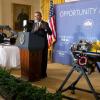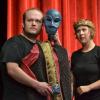Science & Technology
 <p>A new study led by the University of Colorado Boulder bolsters the theory that the first Americans, who are believed to have come over from northeast Asia during the last ice age, may have been isolated on the Bering Land Bridge for thousands of years before spreading throughout the Americas.</p>
<p>A new study led by the University of Colorado Boulder bolsters the theory that the first Americans, who are believed to have come over from northeast Asia during the last ice age, may have been isolated on the Bering Land Bridge for thousands of years before spreading throughout the Americas.</p>- <p>The University of Colorado Boulder’s Real Estate Council will hold its 17th annual forum Wednesday, March 5, from 7 a.m. to 5:30 p.m. at the Denver Marriott City Center.</p>
 <p>NIST news release</p>
<p>NIST news release</p>
<p>JILA physicists used an ultrafast laser and help from German theorists to discover a new semiconductor quasiparticle—a handful of smaller particles that briefly condense into a liquid-like droplet.</p>
<p>JILA is a joint institute of CU-Boulder and the National Institute of Standards and Technology (NIST).</p> <p>The University of Colorado Boulder and the Colorado Office of Economic Development and International Trade will be part of the new Digital Manufacturing and Design Innovation Institute announced today by President Barack Obama.</p>
<p>The University of Colorado Boulder and the Colorado Office of Economic Development and International Trade will be part of the new Digital Manufacturing and Design Innovation Institute announced today by President Barack Obama.</p> <p>Following on the heels of its nationally recognized anti-violence school tours based on “The Tempest” and “Twelfth Night,” the <a href="http://www.coloradoshakes.org/">Colorado Shakespeare Festival</a> has hit the road with a new production of “Much Ado About Nothing.”</p>
<p>Following on the heels of its nationally recognized anti-violence school tours based on “The Tempest” and “Twelfth Night,” the <a href="http://www.coloradoshakes.org/">Colorado Shakespeare Festival</a> has hit the road with a new production of “Much Ado About Nothing.”</p> <p>University of Colorado Boulder scientists have found a creative way to radically improve thermoelectric materials, a finding that could one day lead to the development of improved solar panels, more energy-efficient cooling equipment, and even the creation of new devices that could turn the vast amounts of heat wasted at power plants into more electricity.</p>
<p>University of Colorado Boulder scientists have found a creative way to radically improve thermoelectric materials, a finding that could one day lead to the development of improved solar panels, more energy-efficient cooling equipment, and even the creation of new devices that could turn the vast amounts of heat wasted at power plants into more electricity.</p>- <p>For University of Colorado Boulder Assistant Professor Gordana Dukovic of the Department of Chemistry and Biochemistry, the awards just keep rolling in.</p>
<p>Today the Alfred P. Sloan Foundation announced that Dukovic was one of 126 people in the U.S. and Canada selected for one of the prestigious Sloan Research Fellowships in 2014. </p> - <p>New findings on why skeletal muscle stem cells stop dividing and renewing muscle mass during aging points up a unique therapeutic opportunity for managing muscle-wasting conditions in humans, says a new University of Colorado Boulder study.</p>
- <p>
</p><div class="embedded-video">
<div class="player">
<iframe width="640px" height="360px" src="//www.youtube.com/embed/ZnOhqQALc1M?width=640px&height=360px&theme=dark&autoplay=0&hd=1&rel=0&showinfo=1&modestbranding=0&iv_load_policy=1&autohide=1&start=0&wmode=opaque" frameborder="0" allowfullscreen=""></iframe> </div>
</div> - <p>Recently derived equations that describe development patterns in modern urban areas appear to work equally well to describe ancient cities settled thousands of years ago, according to a new study led by a researcher at the University of Colorado Boulder.</p>


